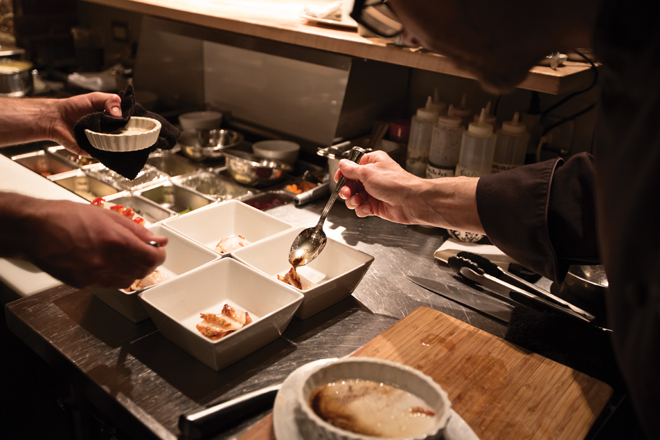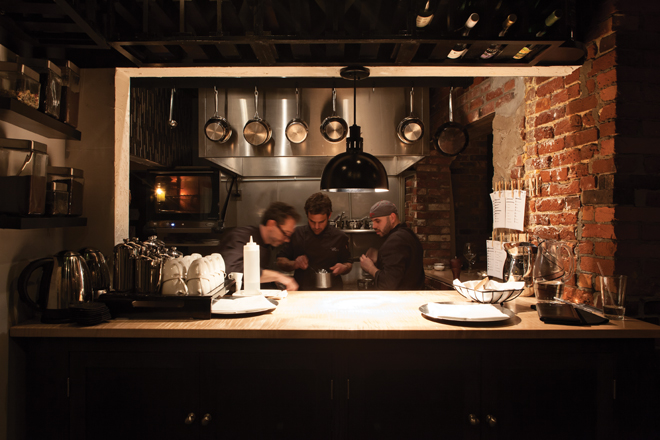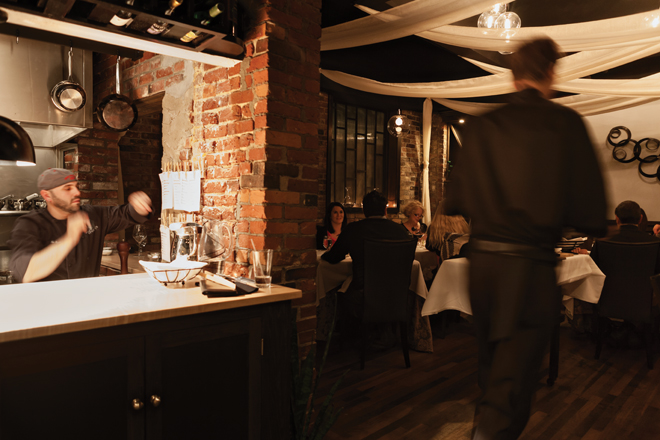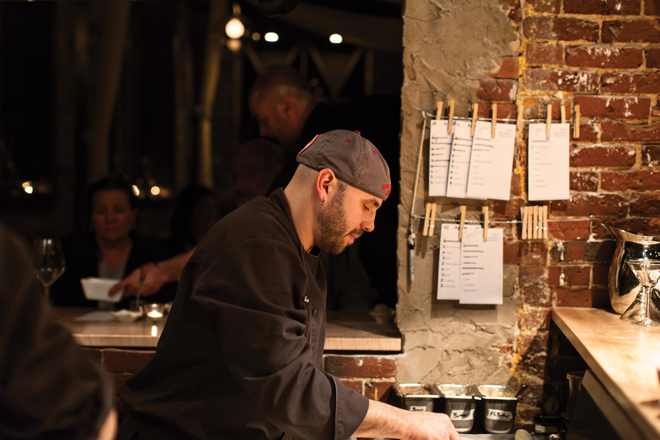David’s Opus Ten
Opus Ten is a dining experience built on trust. This is a trust that chef David Turin has earned from his customers after over 20 years of operation in Portland. The experience is designed to be completely effortless, rewarding those who allow themselves to let go and enjoy an orchestrated and appropriately portioned nine-course set menu with painstakingly coordinated wine pairings. Eating at Opus Ten is about simply showing up and letting Turin do what he loves the most: cook.
My faith in Turin has been justified time and time again, with every bite leaving me in excited anticipation of what may be coming next. The meal is an incredible sensory experience, with Turin’s bold signature flavors becoming even more intense in smaller presentations.
The most confusing element of Opus Ten is that it is located inside of an existing restaurant, David’s Monument Square. Patrons are escorted through the bustle and hum of the dinner rush at David’s to arrive in the calm of an 18-seat dining room that sets the tone for them to relax and enjoy the show.
According to Turin, “the concept of a restaurant within a restaurant was actually a bit of a vehicle rather than an inspiration. I wanted to do Opus Ten very badly but was growing increasingly frustrated in my search for the right space, and then it hit me–why not utilize a space that I already own?”
After spending hours consulting with architectural firm Kaplan Thompson regarding what this experience should embody for both chef and guests, which Turin describes as “more like a series of therapy sessions than design brainstorming,” Turin and his team finally developed the concept. The challenge was to take what was already a very small space and center it around a functional kitchen that could fit three cooks, which would inevitably impart an element of theater for the guests. The food and service needed to be the primary focus, so the decor was to remain understated and streamlined.
“Out of the ten restaurants that I have opened,” Turin assures me, “this is the smallest yet the most challenging to build. But it was also the most rewarding.”
Once Opus Ten went live on the evening of November 20, 2012, Turin and his crew faced the challenge of conveying the concept of a completely chef-driven restaurant to their guests. Prices are kept very reasonable, running $65 for the weekend nine-course and $55 for the seven-course menu offered on weekdays, with wine pairings at $45 and $35 respectively. Portion sizes were adjusted to toe the line between satisfying those with a large appetite and not intimidating those without one. Turin describes it as a “familiar-sized meal that is simply broken down into nine plates. It’s like having three slices of pizza but each slice is cut into thirds. Very nicely cut, I might add!”
As guests are seated and the kitchen whirs into motion, the first portion of service is performed tableside: a cocktail is cobbled together from the various elements of the drink cart. This selection rotates weekly, featuring such creations as the Smoky Apple, which combines Bulleit Rye, Liberty apples, lapsang souchong tea, and sweet vermouth with bitters and orange zest. Once the drink situation has been seen to, a procession of “snacks” begins: serrano ham, manchego, warm olives, and crackers made from sunflower seeds, flaxseed, roasted almonds, and dried cranberries that I can’t help but compare to Nature Valley granola bars–in a good way.
As preparations for the first course begin, servers deftly change out stemware to accommodate the style of wine being poured. The pairing process is a collaboration between Turin and his front-of-the-house captains, involving a good deal of rethinking when an obvious choice is less perfect than they would prefer it to be. Wines, as well as the occasional beer or sake, are not restricted to any particular region of the world, and no varietal is too obscure for consideration. Of course, the full wine list is available regardless of whether or not one opts for the chosen pairings.
As for the menu itself, Turin describes it as “the food that I like to cook and eat. My cooking style has always been more about execution rather than ingredients. My culinary heroes are chefs like Paul Bocuse rather than Ferran Adrià, so the food is relatively easy to understand, the palate can handle it without getting confused by too many elements, and you’ll most likely recognize 80 percent of the ingredients. In the end it’s not only about how it tastes, but how the courses in a menu we’ve written fit together and tell a story.”
Alhough the menu is in constant rotation, dishes revolve around a central theme that I feel is best described as “sensual.” An earthy morel and chanterelle mushroom gratin, not unlike a bite-sized deep-dish pizza, is served alongside a luscious, impossibly rich Madeira cream shooter, layered up with foam so that it resembles a perfect cappuccino. The brisk acidity of the Schloss Gobelsburg Grüner Veltliner “Gobelsburger” lances through the density of the dish, offering notes of lemon, pepper, and the faintest hint of celery. Later in the progression, the delicate char on a grilled half of quail imparts a smoky flavor to a salty, decadent slab of foie gras served atop a small round of wheat rye baguette cooked in duck fat and honey, scattered with dried-cranberry preserve. The plum, fig, leather, and chocolate notes of the Zonin Valpolicella Ripasso manage to somehow heighten and accentuate what was already perfect to begin with.
Turin makes occasional appearances on the floor throughout the meal, at one point showing up at our table to pour frozen basil-infused vodka directly onto my raspberry and apple sorbet, elevating the dish from palate cleanser to frosty libation. It is apparent that Turin is having a really good time, chatting up guests between administering spirits.
When asked to speak to the primary challenges of executing a menu like this, Turin replies that “it’s very hard to only be cooking nine dishes at a time. But like all great cooking you don’t make something better by adding to it continually; you make it better by taking components away until you strip it down to its essential elements. It takes a lot of self-discipline to stop and remember what’s been correctly said so many times: that the dish is done not when you can’t add anything more to it, but rather when you can’t take anything else away.”
All you have to do is let go, relax, and trust David Turin. You will be happy that you did.
22 Monument Sq. | Portland | 207.773.4340 davidsopus10.com



































